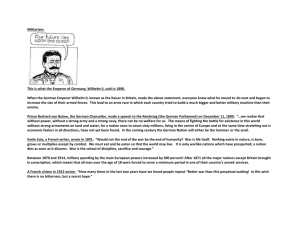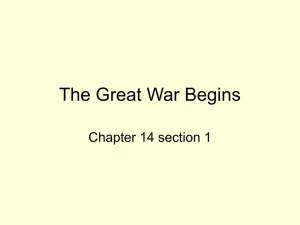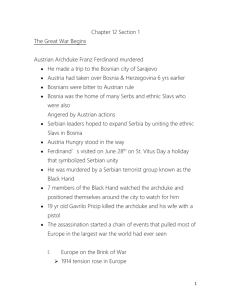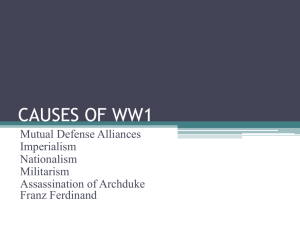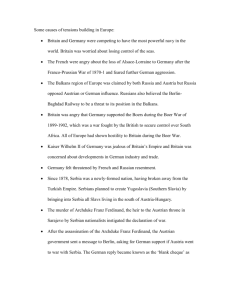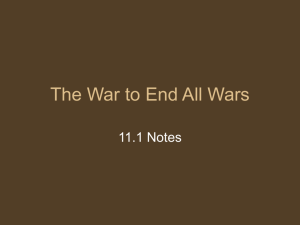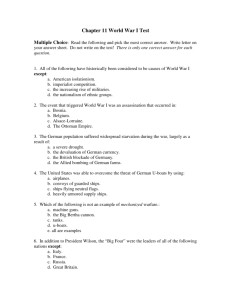World War 1
advertisement
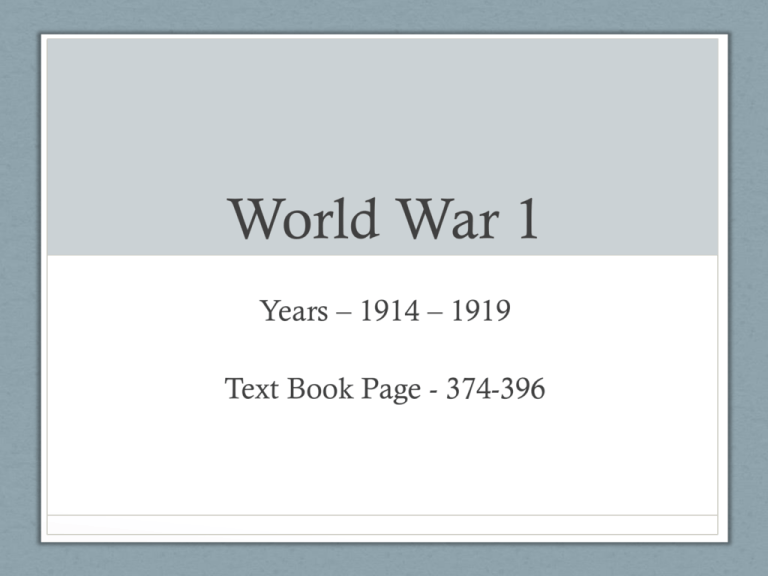
World War 1 Years – 1914 – 1919 Text Book Page - 374-396 Main Idea of WWI “World War I began in Europe. However, other world powers, as well as European colonies around the world, were drawn into the conflict.” Chapter 14 Vocabulary • Pacifism • Stalemate • Militarism • No man’s land • Entente • Zeppelin • Ultimatum • U-boat • Mobalize • Convoy • Neutrality • Total war • Atrocity • Conscription • Self –determination • Propaganda • Armistice • Collective security • • Pandemic Reparations Important People • Kaiser William II • Woodrow Wilson • Archduke Francis Ferdinand • David Lloyd George • Gavrilo Princip • Czar Nicholas II • Alfred von Schlieffen • T.E. Lawrence • Arthur Zimmerman • Georges Clemenceau • Vittorio Orlando 1914 – 1919: Overview • Two huge alliances emerged in Europe: the Central powers, dominated by Germany and Austria-Hungary, and the Allies, led by France, Britain, and Russia • Assassination of Archduke Francis Ferdinand 1914 ignited World War I, historians agree that all the major powers share blame for the conflicts • Trench warfare and new weapons contributed to a stalemate on the Western Front 1914 – 1919: Overview • 1917, USA entered the war, allowing the Allies to achieve victory • Paris Peace Conference imposed heavy penalties on Germany and redrew the map of Eastern Europe Section 1 – Stage is Set • Pursuit of Peace • World attempts at peace • Olympics 1896 & Nobel Peace Prize • Pacifism – opposition to all war • First Universal Peace Conference Causes of World War 1 • M. Militarism • A. Alliances • I. Imperialism • N. Nationalism Militarism • Glorification of the military • Grew out of Social Darwinism • Arms race - expand their armies & navies • *Germany & Britain fierce competition Industrialized War • Automatic machine gun • Tanks & jeeps • Submarine (U-boats) • Airplane • Poison gas & gas mask • Zeppelins • Convoys Alliances • Tangle of alliances • Distrust led the great powers to sign treaties to defend one another • Two alliances emerged • Triple Alliance – Italy, Austria- Hungary & Germany • Triple Entente (Allies)– France, Britain, Russia Imperialism • Imperial rivalries divided European nations • Economic interests – competition! Nationalism • Aggressive Nationalism • Germany & France – strong resentment because of a previous war (Franco-Prussian War 1871) • Germany wanted revenge for “lost provinces” • Eastern Europe: Pan Slavism united Slavic peoples under South Slavic State (Russia leading) Section 2 - Guns of August • Archduke Francis Ferdinand visits Sarajevo, capital of Bosnia • Serbian nationalists outraged by the visit • Even more angry b/c visit was the same date that in1389 the Serbians were conquered by Ottomans • Same date in 1912 declared independence from Turkish rule Fatal Shot ** SPARK ** • Archduke ignored the warnings • June 28, 1914 - open car with wife Sophie • Conspirators hurled a bomb at passing car – missed • Later, Gavrilo Princip fired twice – duke & wife dead The Ultimatum • Ultimatum – or final set of demands • To avoid war Austria sent Serbia a set of demands • 1. Serbia must end all anti Austrian agitation • 2. punish any Serbian involved in the murder plot • Serbia agreed to most but NOT all terms • June 28, 1914 Austria declared war on Serbia Capital to Capital • Diplomats sent notes from capital to capital across Europe • Forced larger forces into a deeper conflict • Austria might not have pushed Serbia into a war without the backing of ally Germany – Kaiser William II wrote Austria a “blank check” • Serbia had an alliance with Russia (Pan Slavism) Capital to Capital • Russia’s czar urged Austria to soften demands to avoid war --- failed • Russia mobilized (prepared) their army • Russia appealed to their ally France • France hated Germany (Franco-Prussian War payback) • Germany demanded France stay out – they did not back down – Germany declared war on France **Schlieffen Plan** • Italy & Britain remained neutral & uncommitted • Alfred Von Schieffen a German war general developed a plan to attack France • Avoid a 2 front war • Schlieffen thought Russia would be slow to mobilize • Germany would defeat the French quickly & then fight Russia Schlieffen Plan • German armies march through Belgium to attack French – August 3 they march through Belgium • Marching through Belgium outraged Britain • Britain had a treaty with Belgium guaranteeing they would protect Belgian neutrality • Britain Declares war on Germany Section 3 – New Conflict “Modern weapons resulted in huge numbers of casualties and helped prevent either side from gaining an advantage” “A war of many fronts” Western Front • German forces swept through Belgium toward Paris. • Russia mobilized more quickly than Germans expected • They won a few victories in east so they sent more troops to the east (bad idea…weakened German forces) • British Troops reached France and aided along the Marne River --- dug in for the winter STALEMATE Trench Warfare & No man’s land Costly Battles • 1916 both sides launched offensives to break the stalemate • German forces tried to overwhelm the French at Verdun • 11 month struggle – 500,000 casualties on both sides • Somme River – 1 day 60,000 British killed or wounded Eastern Europe • August 1914 Russian armies pushed back into eastern Germany • Battle of Tannenberg - Russia suffered one of the worst defeats in the war • Russia poorly equipped to fight modern war • Throw massive amounts of peasant soldiers into combat Southern Europe • 1915 Bulgaria joined the Central powers (AustriaHungary, Germany, Italy • Italy declared war on Austria-Hungary & Germany • Italians retreated • British and French forces later helped stop the Central Powers’ advance into Italy War Outside Europe • Japan allied with Britain used the war as an excuse to seize German outposts in China and the islands in the Pacific • 1914 Ottoman Empire joined the Central Powers Turks closed off water straits • 1915 Allies sent massive troops to open strait • 1916 Arab nationalists led a revolt against Ottoman rule – British sent Colonel T.E. Lawrence • **Lawrence of Arabia – guerilla raids against the Turks War in the Colonies • European colonies were drawn into the struggle • People in the colonies had mixed feelings about serving • They expected that their service would be a step toward citizenship or independence Section 4 - Winning the War Main Idea – • in their efforts to achieve victory, governments committed all their nations’ resources to the war effort. Total War – • The channeling of a nation’s entire resources into a war effort Collapsing Morale • Economic Impact • Conscription – the draft • Atrocities – horrible acts against innocent people • Propaganda • Is the spreading of ideas to promote or a cause or to damage the opposing cause. • Women in the War • Women took over men’s jobs, kept the economies going Revolution in Russia • March 1917 brought down the Russian monarchy • Allies welcomed the overthrow of the czar • **1918 – Treaty of Brest-Litovsk with Germany • Ended the Russian participation in WW1 USA Enters the War • Unrestricted submarine warfare • Sinking of the Lusitania – May 1915 • Zimmerman Note • 1917 British intercepted a message from German foreign minister Arthur Zimmerman to his ambassador in Mexico • Mexico’s support – Germany would help Mexico reconquering territory lost • Note became public & anti-German feelings intensified in USA USA Declaring War* • April 1917 • Congress to declare war on Germany • 1918 – 2 million men joined the war effort • Saved the western front for the Allies! *Wilson’s Fourteen Points • America failed to maintain neutrality • Wilson wanted to be a peacemaker • January 1918 – issued Fourteen Points • • • • **Freedom of Seas **Free Trade **large sale reduction of arms **End secret treaties • Self – Determination** • The right of people to choose their own form of government Campaign to Victory • By July 1918 German’s exhausted their efforts across France & Belgium • September the German generals told their Kaiser that they would not and could not win the the war. • **** the German people ANGRY • Kaiser William II fled Germany • Austria- Hungry collapses!! Campaign to Victory • German government sought an armistice • Armistice- an agreement to end fighting with the Allies • November 11, 1918 – Great War came to an end Section 5 – Making Peace Main Idea – • In their efforts to achieve victory, government committed all their nations’ resources to the war effort. Cost of World War I • Human Costs • 8.5 million dead • 17 million wounded • Political Costs • Collapse of governments • Unrest in colonies • Rising threat of communism • Financial Costs • War loans, much destroyed, loss of economic power in Britain Costs of World War I • Pandemic • Spanish Flu • 1918 – 20 million people dead! • Political Turmoil • governments collapsed in Russia, Germany, AustriaHungary & Ottoman Empire • Chaos in Russia • Chaos in colonies Paris Peace Conference ** Big Three ** British Prime Minister – David George USA President – Woodrow Wilson French leader – Georges Clemenceau Difficult Issues • Collective Security • A system in which a group of nations acts as one to preserve the peace of all • *** League of Nations!!!*** • Attempt to act as a peace keeper in Europe • Weak & ineffective due to the absence of the USA **Treaty of Versailles** • June 1919 • Germans were ordered to sign a treaty drawn up by the Allies • Germans forced to • • • • take blame for WWI To pay huge reparations for war damage To pay Allied soldiers or their widows & families $ 30 billion Treaty of Versailles • Was more about revenge than lasting peace • Germany’s responsibility for the war and their loss of territory • Start of WWII is a direct result of the harsh treatment of Germany after WWI. • 20 years later – and even deadlier war!! Results of WWI • Demanded economic retribution from Germany, Austria, Bulgaria & Turkey • Aus -Hungary lost 2/3rds of its empire – formed new nations of Yugoslavia (Serbia), Czechoslovakia, Hungary, Austria Be able to answer: • How did the industrial revolution affect the course of the war? • How did the treaty of Versailles punish Germany? • What do you think Woodrow Wilson meant by “peace without victory”?
